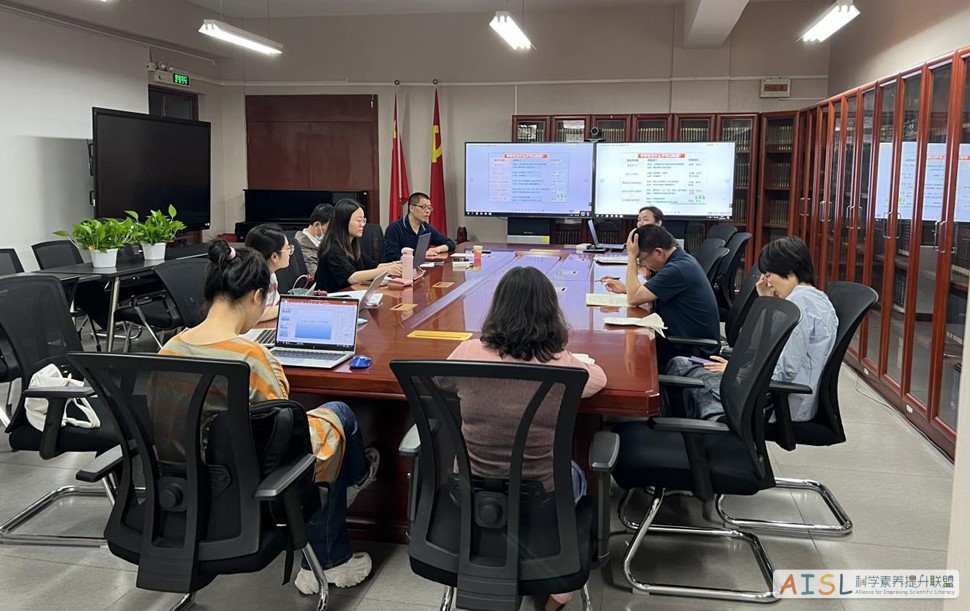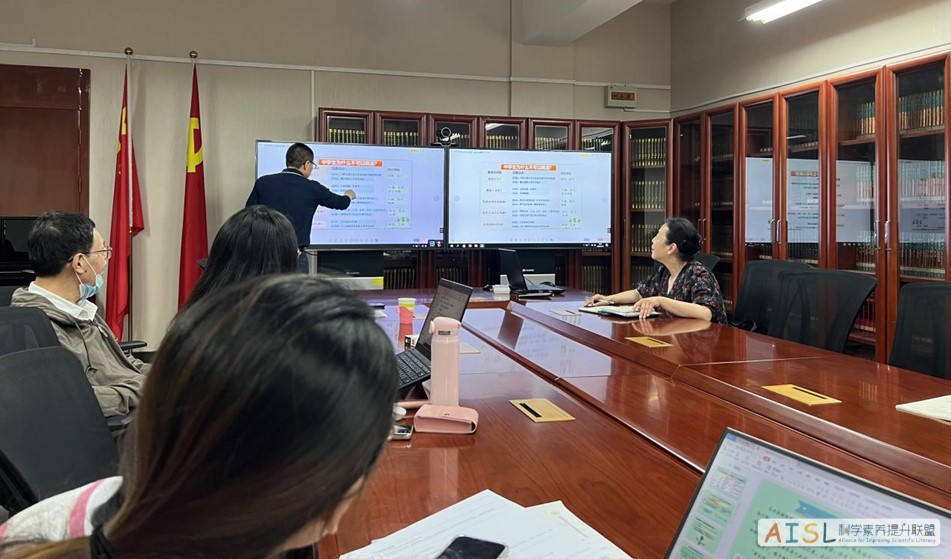2023年5月16日上午,首都师范大学附属育新学校社会性科学议题学习合作研究项目研讨会在中学部图书馆会议室顺利举办。SSI-L项目学科指导专家组组长、北京师范大学第二附属中学物理学科特级教师彭梦华,项目学科指导专家、北京师范大学《化学教育》专职副主编、编辑部主任朱玉军出席会议,与首都师范大学附属育新学校课程中心唐枫主任、学校级部改革主任曹学龙、初一项目组成员就本校“中学生为什么不能喝酒——酒的由来、饮用与监管”课程进行了讨论。

本次研讨基于课程整体设计,主要聚焦课程实施。会议首先由曹学龙主任、于北鸿老师、蔡欣老师分别结合课程录像、学生学习成果照片对已经实施的四次课程进行分享交流,包括学生课程参与情况、课堂生成性问题、课程实施经验、课程需要改进之处等。与会专家肯定了目前的课程进度,认为前期课程预期目标基本达成,强调了生成性问题价值。
随后课程中心唐枫主任介绍了项目组前往酿酒厂为学生后续参观进行的踩点情况。唐主任的汇报中提到,酒厂有视频、道具和模型展览,学生前往参观不仅能看到酒厂历史发展脉络,了解酒的由来、工艺、历史、经济、文化等内容,更能直观感受酒的生产过程。与会专家肯定了课程实地参观的实践活动安排,并对酒厂参观计划提出了具体建议——如带着问题开展实地调研,教师可以从文化、历史、科学、经济等角度进行引导,将研究问题立意与学生兴奋点结合,参观结束后要给学生充分讨论与交流的机会,让学生试着从原材料、制作过程等角度分析如何保证酒的质量等问题,回扣本阶段的课程主题。

最后,项目组任课教师交流分享了后续课程实施的计划,在小组交流基础上,专家提出指导意见,如教师要明确每节课学生活动的表现指标和成功指标是什么,通过设计演示讲解、评价和讨论等教学活动训练学生的高阶思维,检验教学目标的达成情况,同时要及时反思课堂中学生的生成性问题,为课程寻找生长点。

研讨中所有成员畅所欲言,思维碰撞互相启发,此次研讨为初一项目组提供了切实可行的行动建议,指明了下一阶段课程的建设方向。
图文供稿:育新学校 吴璇
On the morning of May 16, 2023, the SSI-L project seminar was held in the library in the middle school department at Yuxin School Attached to Capital Normal University. Peng Menghua, leader of the SSI-L project subject guidance expert team, and a special ranked physics teacher at the Second High School Attached to Beijing Normal University, Zhu Yujun, project disciplinary guidance expert, full-time deputy editor-in-chief and director of the editorial department of Chinese Journal of Chemical Education at Beijing Normal University attended the meeting and discussed the curriculum “Why middle school students shouldn’t drink alcohol – origin, consumption, and regulation of alcohol” with the partner school project team. Tang Feng, Director of the Curriculum Center at Yuxin, Cao Xuelong, Director of the school’s Grade Reform Department at Yuxin, and members of the Grade 7 project team at Yuxin joined the meeting.
The discussion focused on the curriculum’s design and its classroom implementation. At the meeting, Cao Xuelong, Yu Beihong, and Cai Xin shared the instructional design of four activities combined with the video records and photos of students’ learning outcomes, including students’ participation, generative questions during the learning, teachers’ experience in implementing the curriculum, and the further improvement. The experts at the seminar affirmed the initial success in curriculum design and implementation, believed that the expected curriculum goals in the previous phase were achieved, and emphasized the value of the generative questions from students.
Director Tang Feng from the Curriculum Center of Yuxin then introduced the project team’s preparation for the student’s visit to the brewery. In her report, Director Tang mentioned that there are video exhibits, props, and model exhibits in the brewery. Students participating in the brewery tour will not only see the development of the brewery’s history, but also learn about the origin, production, history, economy, culture, and other aspects of brewing. Thus, students will have a firsthand experience. The experts at the seminar supported the practical arrangements of the curriculum’s on-site visits and made specific suggestions on the brewery tour plan. For example, they suggested conducting field research with driving questions and guiding students from cultural, historical, scientific, and economic perspectives. They also recommended integrating research questions with students’ interests. After the visit, students should have sufficient opportunities for discussion and communication. Teachers should encourage students to analyze how to ensure the quality of the alcohol from the aspects such as raw materials and production process and relate it back to the curriculum’s theme of the present phase.
Finally, the teachers in the project team exchanged their plans for the follow-up curriculum implementation. Based on the group discussion, the experts offered guidance that teachers should clarify the performance indicators for student activities in each class, train students’ higher-order thinking by designing teaching activities such as demonstration and explanation, evaluation and discussion, and test the achievement of teaching objectives, while timely reflecting on students’ generative questions in class to advance curriculum development.
During the discussion, all members voiced their views freely. Their thoughts collided and inspired each other. This seminar provided practical and feasible action suggestions for the Grade 7 project team at Yuxin and indicated the direction of the next phase of curriculum construction.
